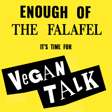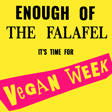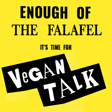
205- Aren't sheep really destructive? (and other myths)
In our third visit to East Lothian, this episodes features an in-depth interview with Julie about the four sheep in her life, talking about what it takes to look after sheep in a companionship setup (rather than an exploitative one), as well as discussing some of the misconceptions and myths that surround these wonderful peaceful creatures.
For the first two episodes in this series, head back to episodes 50 and 101.
As ever, we love hearing your views on the topics under discussion (or anything else!) so do drop us your thoughts via enoughofthefalafel@gmail.com
*************
Enough of the Falafel is a community of people who love keeping on top of the latest news in the world of veganism & animal rights. With the Vegan Talk podcast, we aim to develop listeners' (& our own) thoughts around key issues affecting veganism & the animal rights movement; giving our opinions, whilst staying balanced; remaining true to our vegan ethics, whilst constantly seeking to grow & develop.
Each week we home in on one topic in particular and pick it apart in more detail. If you have a suggestion for a future show, do get in touch via enoughofthefalafel@gmail.com.
*******************
Thanks everyone for listening; give us a rating and drop us a message to say "hi"; it'll make our day!
Nuala, Iris, Kendric, Rona, Julie, Anthony & Mark


